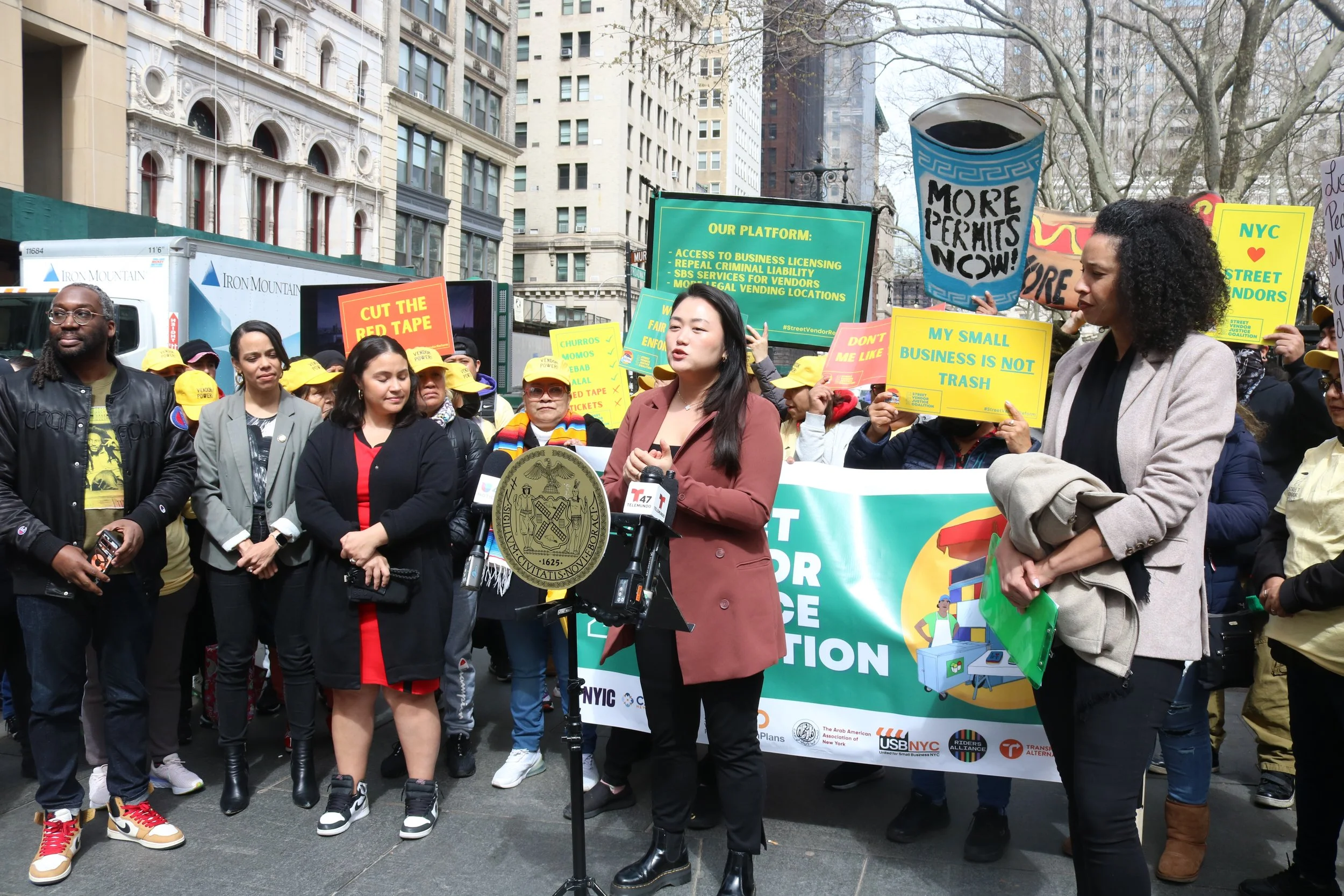Pols protest Sanitation Department’s new vendor enforcement role
/City Councilmembers, including Queens delegation members Julie Won and Jennifer Gutierrez, join street vendors and advocates in protesting vendor enforcement being passed to the DSNY at City Hall. Eagle Photo by Ryan Schwach
By Ryan Schwach
Following the Mayor Eric Adams’ decision to transfer the enforcement of street vendors from the Department of Consumer and Worker Protection to the Sanitation Department, vendors, advocates and lawmakers rallied outside City Hall on Wednesday to call for the reversal of the move and reforms to the city’s vending rules.
Electeds and advocates argued that the policy change does little to advance reforms, including increasing licensing access, repealing criminal liabilities, allowing Small Business Services to serve street vendors and opening more legal vending locations, and instead only pushes enforcement.
“Placing the enforcement of vendors in the hands of an agency that deals with trash sends the wrong message,” said Bronx Councilmember and Chair of the Sanitation Committee Sandy Nurse. “Our vendors are not trash. Street vendors represent the smallest businesses in New York City.”
Nurse, who organized the rally, said the decision caught a number of lawmakers off guard and was made without any oversight or comment from the council or advocates.
“Many of us are just very confused why this announcement would come two days after the preliminary budget hearing on Sanitation, where we could have had an opportunity to learn more about this announcement and engage in meaningful dialogue,” she said.
Nurse was joined by fellow council members Alexa Aviles, Pierina Sanchez and Queens Delegation members Jennifer Gutierrez and Julie Won.
“I'm floored by this decision to move enforcement to DSNY,” said Gutierrez, whose district includes Ridgewood. “The only thing I hear is trash. The only thing I hear is all of their inventory that they work so hard, all of the items that they work to produce to nourish our communities, is going to be thrown in the garbage.”
The vast majority of the street vendors present Wednesday were Latin American immigrants, a population that makes up much of the street vendor population in New York City.
“These are our aunties, our uncle, our sisters, our mothers, our grandmothers,” said Won, who herself emigrated from South Korea as a child. “How often do you see a churro lady on the subway with her baby? How often do you see these grandmothers taking care of their children while vending? This is the lifeline for immigrants like me who came to this country, it is unacceptable that we are treating them as if they are trash.”
Cleotilde Juarez, a street vendor who serves Mexican dishes in Corona said she is worried that the enforcement push could make it harder to provide for her three children.
“Back in the day she would get her stuff taken away when a DSNY truck would come and dump all her merchandise into the garbage,” she said through a translator. “It would be helpful if there were more permits, more licenses, and we were recognized as small businesses.”
When announcing the change last week, Adams said that unregulated street vending causes an increase in quality-of-life issues.
“Street vendors are a vital part of New York City’s economic and cultural landscape, but unregulated street vending is a quality-of-life concern that affects the health, safety, accessibility, prosperity, and cleanliness of our streets, sidewalks, and neighborhoods,” Adams said in a statement last week.
Officials and advocates said Wednesday that they believe street vendors should be treated more like an average New York City small business.
“The smallest businesses in New York City deserve the same services that brick and mortar companies have, conducting accessible outreach and education and creating more legal spaces for vending,” said Nurse.
Mohammad Attia, a former vendor who now works for the Street Vendor Project wants to see the criminalization of street vending come to an end.
“I always felt like a criminal being targeted by the NYPD for minor violations that are minimal as being few inches away closer to the crosswalk than on supposed to be,” he said. “Nobody wants to break the law. No vendor across the city is happy about breaking the law. Everyone wants to get into the system, but the system is not allowed.”
The enforcement switch comes not long after another Queens councilmember, Sandra Ung, called for more vendor enforcement in Downtown Flushing.
“The lack of enforcement has created a vacuum that not only attracts more unlicensed vendors to Flushing from across the city, but also creates a sense of lawlessness that attracts other criminal elements, like counterfeiters, individuals selling live seafood and illegal weed sellers,” she said earlier this month.
Ung supports the change to DSNY, and believes it will benefit businesses and people in her district.
“I am grateful that Mayor Eric Adams listened to my concerns and is taking proactive steps to make our sidewalks safer for the elderly, mobility impaired, and tens of thousands of daily commuters in this busy and vital retail and transportation corridor,” said Ung. “I look forward to working with the Department of Sanitation and other city agencies to ensure that local residents can walk down the sidewalk in Flushing.”
The responsibilities will officially pass on to DSNY on April 1, and will be managed by a vending bureau, according to City Hall.
DSNY will only take over the enforcement of street vendors, DCWP will still deal with vendor licensing, and the Department of Health and Mental Hygiene will continue to inspect the vendors.




